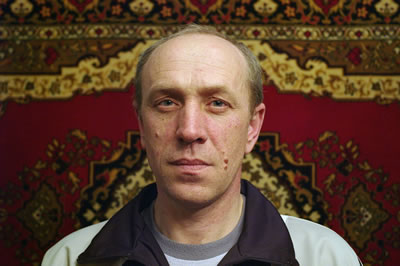Vladimir Ivanovich Filatov was born in February
1960 in the village Novo-Troickoe of Dolgorukovski region
of Ukraine. He lives in one of the poorest and most
run-down areas of Donetsk, and its here in his home
that we meet him. Its dark, and outside the blocks of
flats there are no street-lights. We walk quickly as
there is a high level of criminality in the area and
the temperature is bitterly cold with ice and snow challenging
our progression. As we approach the appropriate block
a large shadow of a man looms in front of us. He steps
forward and speaks in a soft voice reaching out to us
with an enormous hand. We are relieved to discover its
Mr Filatov. We shake hands, exchange pleasantries and
follow him as he escorts us to a tiny elevator, which
leads to his small apartment in one of the many blocks
which surround us.
Vlad is nervous about our visit but after a few minutes
he begins to tell us about his story. In his early years
he worked on a collective farm in the countryside but
at the tender age of 18 he was conscripted to join the
army of the Soviet Union and by 1980 he was serving
in the Afghanistan wars where he was injured with shrapnel
and contracted malaria.
Vlad sifts through paperwork showing us the enormous
amount he needs to get through to claim his Chernobyl
pension. After his army service he worked in a chemical
factory where he remained until 1986 when he was called
up to serve in the army again, this time to work at
the Chernobyl power plant. Vlad speaks in a quiet humble
way and he begins explaining his role at the power plant,
“I was working on the construction of the sarcophagus
for 4 hours a day but I still received a lot of radiation,
I had no idea how serious the consequences would be”.

Before Chernobyl Vlad was a healthy young man but as
he goes on to explain it wasn’t long before the
effects on his health would become apparent. He often
has no energy, feels dizzy and cannot hold-down his
food. He has undergone several operations on his stomach
and has recurring tumours removed from his throat. He
requires constant medical care and regular operations
on his oesophagus to enable food to flow to his stomach.
He can only consume foods that are in a soft or liquid
form.
We asked Vladimir if there is any permanent solution to
his problem and he answered that the best he can hope
for is the possibility to receive the drugs which he needs
and cannot currently afford, and the operations. The drugs
help stop the tumours recurring and dissolve the food
he has digested. For many others life would not be worth
living with these problems, and suicide rates are very
high for surviving Chernobyl liquidators.
With seemingly insurmountable problems and such a hostile
environment to live in Vlad lives for his wife and teenage
daughter who is studying at university. They provide
a lot of encouragement and financial support for Vladimir,
without which he beleives he would not survive.
You can make a difference to Vlad’s life and
his family by making a donation to us. Your contribution
will help purchase the drugs and operations Vlad needs.

<<
back